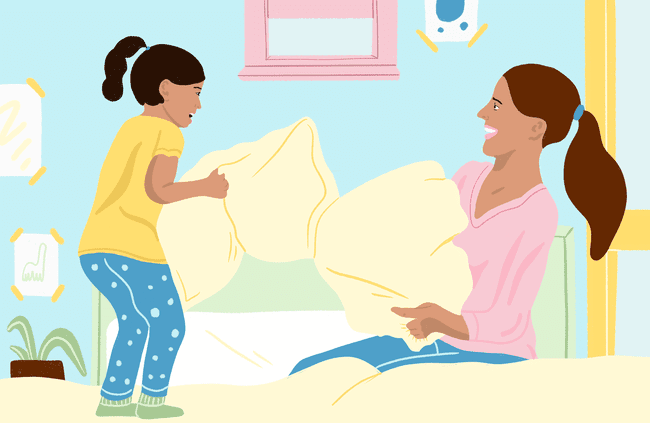Worries and fears are a normal part of childhood, but sometimes they can become more embedded, and a child gets anxious in everyday situations despite their parent's many reassurances. Sometimes anxiety can get in the way of sleep or enjoying life to the fullest.
This can be especially true in the midst of the coronavirus pandemic, where uncertainty looms and constant news reports can trigger anxiety.
Good news is play can be the perfect antidote to fear. “Play provides both tension relief and a safe space to tackle difficult topics,” says Katie Hurley, LCSW, a Los Angeles-based psychotherapist and author of The Happy Kid Handbook. “Children use imaginary play and all kinds of manipulatives (dolls, stuffed animals, building bricks, etc.) to express emotions that are difficult to articulate.” During the pandemic, for example, Hurley says kids may set up a town with walls around it to represent their fears.
In The Opposite Of Worry, Lawrence J. Cohen, Ph.D., psychologist and play expert, also explains how children gravitate towards play to work through difficult experiences. Dr. Cohen writes, “by pretending or by retelling the story the scene can be re-created but this time the child is in charge. Through playing it out, emotional healing takes place.”
While in quarantine with your child, here are some ways to help play away their anxiety.

Offer Special Time
Set a timer for 10-15 minutes. Tell your child it's "special time" and that they can do anything they like for this period. Make sure your phone is turned off and that this is one-on-one time with just you and your kid.
Follow your child's lead; let them choose what they want to do. Perhaps they invent a scenario where they get to be the teacher telling you what to do, or they role play a bossy older sibling. There's no need to do anything, other than just let them direct the kind of play that feels good to them.
When special time is performed regularly it becomes a positive outlet your child can depend on. “Special time offers a safe space for a child to play out their feelings or talk about them without the threat of an adult freaking out right along with them—that’s huge,” says Tosha Schore, parent coach and co-author of Listen: Five Simple Tools to Meet Your Everyday Parenting Challenges. “It sends the message: ‘I can be scared, and if a loving adult is by my side, I can figure out how to move beyond that fear.'”
Follow the Laughter
When a child experiences fear or anxiety their body naturally prepares for fight, flight, or flee. Stress hormones like cortisol and adrenaline are released. Their heart beats faster and there’s an increased blood flow to the muscles to get ready to avert danger. In this state, relaxation is difficult and the body’s digestive system can also be affected, hence why anxious children report that they have stomach aches.
This is where laughter can help. Laughter relaxes the muscles, reduces stress hormones, and triggers the release of endorphins—aka the feel-good hormones—which in turn lowers blood pressure.
Notice what makes your child laugh and simply try to recreate that.
Give Them the Power
When children feel scared, there is nothing like reversing the roles and giving them the power. You can set up scenarios to make this happen. For example, a pillow fight where they knock you over, or a tug of war where they pull you to the other side of the room. The trick is to not physically overpower your child or tickle them but put up a little bit of resistance and then allow them to win.
You can even invite your child to "scare" you by standing next to a dark room and saying, ''I hope you don't push me into this dark room.'' Then you can pretend to be afraid, which helps your child feel even more powerful. Dr. Cohen also suggests role-playing a monster, but being a bumbling, incompetent one that chases your child and can't catch them.
In the end, the benefits of physical play can be transformative. "Roughhousing, or rough-and-tumble play is the ultimate activity for anxious children because it gets them moving, builds bodily awareness, maximizes playful touch, and strengthens relationships," writes Dr. Cohen.
